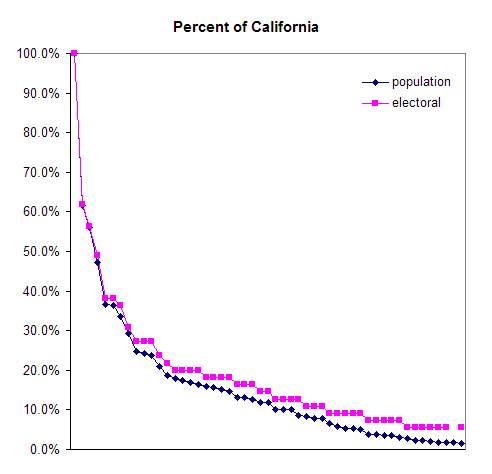|
Stardate
20031015.1643 (Captain's log): Chris Anderson writes:
Your recent essays have returned my mind to an argument I was having with my brother about the necessity of the Electoral College. I was having trouble putting into words the large and important reasons for it and I hoped you could put out a concise explanation of its purpose, if you believe it has one.
(Concise? Me? heh-heh-heh...)
It was part of a compromise which made it possible for the Constitution to be ratified and the US to be established in its current form.
Europe right now is wrestling with the same problem: the concern of small states that they'll be totally overwhelmed by the larger states, which is causing them to demand changes in the proposed EU constitution. At the Constitutional Convention in 1787, the compromise was the two-chamber system, where all states were equally represented in the Senate while representation in the House was proportional to population. (Before ratification of the 17th Amendment, senators were selected by the state legislatures, whereas representatives have always been elected by popular vote. That was another element of the compromise.)
Without such a compromise, for instance if the proposed Constitution had only had a single chamber where representation was population-based, the smaller states probably would not have ratified it.
That was one of several important compromises which were made that summer in Philadelphia so as to maximize the chance of ratification. Another was to defer certain proposals. Instead of including them in the Constitution itself, they were proposed as amendments once the Constitution had actually been ratified. There were 12 of them, and ten were ratified almost immediately, those which we now call the "Bill of Rights". Another one had to do with Congressional pay raises and was ratified in 1992 (the 27th Amendment). The final one won't ever be ratified because it would set a ceiling on the population in House districts which would force the House to expand to more than 5,000 members.
The details of the Electoral College were straightened out with ratification of the 12th Amendment, but it continued the precedent of giving the small states a bit of a boost by allocating one electoral vote to each state for each senator and one for each representative.
Getting the Constitution ratified was more than enough of a reason for doing this even if it had no other benefits at all. But it's instructive to see how it affects the presidential campaign process, in ways which I think are actually relatively positive.
If the President were elected based on national popular vote, many states would be almost entirely neglected and have little influence in that process. The most populous 15 states have two thirds of the population of the US, and they're the ones the candidates would concentrate on. (California has 68 times the population of Wyoming.)
In the existing system, that's not the case. The basic system of the electoral college, especially with nearly all states aggregating their electoral votes into a single winner-take-all package, means that the decision about where to concentrate campaign resources is based more on winnability than size.
For instance, it's a foregone conclusion that Massachusetts will always go to the Democrats, and Republican candidates rarely pay much attention to it. (In 1972, Nixon totally stomped McGovern and won 49 states. Guess which state was #50?)
In 2000, it was pretty certain that Gore would win in California, and Bush didn't put a lot of effort into campaigning here even though California is the largest state. Bush would gain nothing by reducing Gore's margin of victory, and had essentially no chance of defeating him. 55 electoral votes are a huge prize, but one which was out of reach. Likewise, Gore had no significant chance of taking Texas, the second most populous state with 34 electoral votes, but also Bush's home state.
Both candidates paid some attention to states they were sure of (e.g. Gore to California) in part to make sure to not cause disgruntled voters to get angry about being taken for granted and in part to keep the campaign contributions flowing.
The most contested states were those where neither candidate had a clear edge, even if they were relatively small ones where 4-8 electoral votes were on the line. And what that meant was that it really was more of a national election. It was worthwhile for the candidates to pay attention to states with 10% of California's population or even less.
If the election were based on national popular vote, then it would have been worthwhile for Bush to campaign more heavily in California, or rather to campaign in San Diego, LA and the Bay Area. Even if more California voters voted for Gore, every vote he picked up here would add to his total, and California is the most populous state.
That would be OK, but there would also have been much less incentive for the candidates pay attention to the smaller states, and that would not be. The bottom 21 states in the US have fewer people than California alone. They also have different values and interests, and they shouldn't be neglected.

Those 21 states may have less population than California, but they have 91 electoral votes compared to California's 55. (My spreadsheet for this data
|